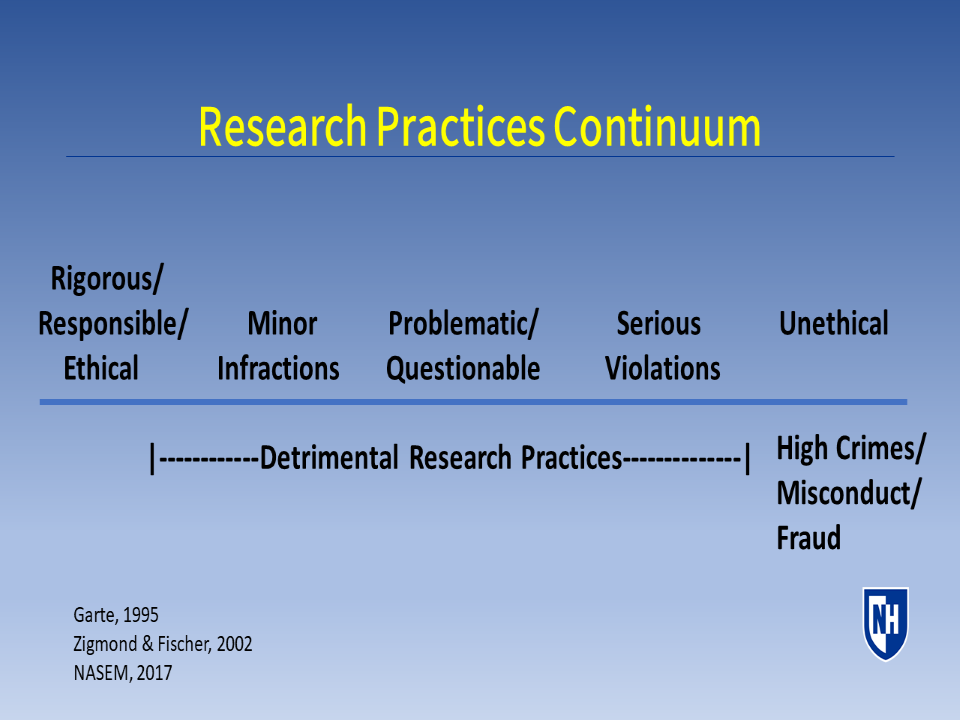
In this module, you will explore the following aspects of misconduct in scholarly activity:
The module consists of:
One of the University of New Hampshire's (UNH) primary missions is to support the creation and dissemination of knowledge. In fulfilling this mission, members of the UNH community undertake many forms of scholarly activity. Ethical conduct in these activities is vital to ensuring the integrity of the scholarly process and its outcomes.
Values fundamental to the ethical conduct of research and scholarship include:
Conducting their work according to these values is key to engendering the trust requisite for scholars to build upon each other's work and collaborate in their activities.
Research practices can be considered on a continuum.

Depending on their nature, most scientists consider actions or behaviors that do not conform to the values and norms of research minor infractions, detrimental to the research process, or serious violations. Three behaviors that directly contravene the values of science and almost universally are deemed as unacceptable are called misconduct.
There have been cases of known or suspected fraud in science and scholarly activity (referred to as misconduct) since the ancient Greeks (Broad and Wade, 1982). Contemporary cases of alleged scientific misconduct involved well-known researchers such as:
Contemporary cases of alleged scientific misconduct involved well-known researchers such as (cont):
Retraction Watch is a blog that chronicles retractions in the scientific literature. They have a "leaderboard" where they list individuals who have had the most papers retracted; many of these are due to actions that constitute misconduct.
This infographic depicts some possible red flags of misconduct.
A meta-analysis by Fanelli (2009) of 18 studies of research integrity found:
Factors found to contribute to unethical behavior include (see this infographic):
Highly publicized cases of misconduct in scholarly activity, especially those involving human subjects, have resulted in substantial setbacks to research activities and scientific progress, and caused irrevocable damage to reputations and public trust in science.
To promote and sustain public trust in the value of research and scholarship, professional organizations, academic and research institutions, and the federal government have established explicit standards governing:
In 1998, the University of New Hampshire (UNH) adopted a policy on Misconduct in Scholarly Activity (Misconduct Policy). This policy defines what actions comprise misconduct at UNH and details the procedures for handling misconduct allegations. The policy defines misconduct in scholarly activity as:
Misconduct does NOT include honest error or differences in interpretations, judgments, or opinion with respect to scholarly issues.
The UNH Misconduct Policy is applicable to all members of the UNH community, including, but not limited to, faculty, staff, and graduate and undergraduate students. Allegations of academic dishonesty against UNH undergraduate or graduate students in normal course assignments are covered by policies of the UNH Student Life office, as outlined in the UNH Student Handbook on Rights, Rules, and Responsibilities.
Fabrication is defined as, "Making up data or results and recording or reporting them" (OSTP, 2000).
Examples of fabrication include, but are not limited to:
The research record is the record of data or results that embody the facts resulting from scientific inquiry, and includes, but is not limited to, research proposals, laboratory records, both physical and electronic, progress reports, abstracts, theses, oral presentations, internal reports, and journal articles.
(OSTP, 2000).Falsification includes, but is not limited to:
While the majority of the historical cases of misconduct listed on Screens 7 and 8 of this module involved fabrication or falsification, contemporary examples of cases involving fabrication and falsification can be found on the Office of Research Integrity's (ORI) website, in the National Science Foundation's (NSF) Office of Inspector General's (OIG) Semiannual Report to Congress (in each report look under Research Misconduct Investigations), and on the Retraction Watch website.
Plagiarism is defined as, "The appropriation of another person's ideas, processes, results, or words without giving appropriate credit" (OSTP, 2000).
Plagiarism includes, but is not limited to:
Plagiarism may also be a violation of copyright law.
According to the National Science Foundation (NSF), when copying text verbatim, approrpiate credit usually involves three factors:
The combination of all three factors ~ Quotation, Citation, and Reference: QCR ~ clearly and unequivocally provides appropriate credit to the original author(s) of the words, and effectively dispels an allegation of plagiarism."
Plagiarism can be a confusing concept, particularly for individuals from cultures and countries with different standards than the United States for handling use of others' words and ideas in research and scholarship. Many resources exist to help students and scholars understand plagiarism, including this infographic that explains concepts of writing ethically, and the following:
Historical plagiarism cases involving scholars include Jane Goodall, Stephen Ambrose, and Doris Kearns Goodwin. Contemporary misconduct cases involving plagiarism are included in the NSF OIG's Semiannual Report to Congress (in each report look under Research Misconduct Investigations) and on the Retraction Watch website.
The recent growth of researchers and scholars using generative artificial intelligence (AI) writing tools, such as ChatGPT, to assist with scientific communication raises significant concerns, including about plagiarism due to the lack of appropriate acknowledgement of source material in output.
When using generative AI writing tools in a specific context, researchers should be mindful of several of the core values of research:
UNH's definition of misconduct in scholarly activity includes, "Retaliation of any kind against a person who has brought forth an allegation of scholarly misconduct or who has provided information about a suspected case of scholarly misconduct because of their participation in the processes articulated in this policy" (UNH Misconduct Policy).
The UNH Misconduct Policy states, "UNH does not condone and will not tolerate any act of misconduct in scholarly activity by a member of its community" (UNH Misconduct Policy).
The UNH Misconduct Policy is guided by the following five principles (UNH Misconduct Policy).
Preponderance of the evidence means that quantity and quality of evidence which, when fairly considered, produces the stronger impression, and has the greater weight, and is more convincing as to its truth than the evidence in opposition applied as the measure of proof.
At UNH, the office of Research, Economic Engagement and Outreach (REEO) enforces the Misconduct Policy. The procedure for handling allegations of misconduct is:
Reporting suspected misconduct is a shared responsibility of all UNH community members. Causes for suspicion of misconduct include, but are not limited to:
UNH's Research Integrity Officer (RIO) is the Director of Research Integrity Services.
or to UNH's Senior Vice Provost for Research, Economic Engagement and Outreach (SVPREEO).UNH encourages community members to consult with the SVPREEO or the RIO if they are aware of inappropriate conduct but uncertain whether it constitutes scholarly misconduct.
Upon receipt of a misconduct allegation, the RIO assesses the allegation to determine whether it falls under the purview of the policy, is frivolous, or for other reasons does not warrant a more thorough inquiry. If it warrants further inquiry, the RIO appoints a stage one investigation team to conduct preliminary fact-finding and information gathering to ascertain if there is cause for a stage two investigation.
The stage one investigation team issues a report to the SVPREEO, who makes the determination whether to pursue a stage two investigation into the case.
If the stage one investigation team finds that there is NO cause to pursue a stage two investigation into the alleged misconduct, the RIO promptly writes a letter of exoneration to the respondentThe person against whom an allegation of scholarly misconduct is directed or the person whose actions are the subject of a stage one or a stage two investigation.
and the matter is considered officially closed.A good faith allegation is one made with the honest belief that scholarly misconduct may have occurred. An allegation is not in good faith if it is made with reckless disregard for or willful ignorance of facts that would disprove the allegation.
, UNH may initiate an inquiry of the complainantA person who makes an allegation of scholarly misconduct.
under University System of New Hampshire (USNH) and UNH policies regarding personal and professional conduct.If the stage one investigation team concludes that an investigation is warranted then the RIO:
The purpose of the investigation is to:
Preponderance of the evidence means that quantity and quality of evidence which, when fairly considered, produces the stronger impression, and has the greater weight, and is more convincing as to its truth than the evidence in opposition applied as the measure of proof.
standard of proof for a finding of misconduct.The stage two investigation team provides via the RIO a final report of its investigation to the SVPREEO. Based on a preponderance of the evidence, the SVPREEO makes the determination whether to accept the stage two investigation team's report, its findings, and the recommended institutional actions. When a final decision has been reached, the RIO notifies the respondent and complainant, in writing.
If the stage two investigation determines that misconduct did NOT occur, then the RIO promptly writes a letter of exoneration to the respondent, and the matter is considered officially closed.
If the stage two investigation determines that misconduct occurred, sanctions may be administered by the appropriate staff, faculty, and/or University official(s), consistent with USNH and UNH policies on disciplinary action.
Internal sanctions range from an oral warning to the issuance of official letters of reprimand, up to and including suspension without pay, termination of employment, or dismissal from UNH.
A sponsor or other federal agency may impose additional sanctions, such as barring researchers from receiving federal research funds in the future.
If a respondent believes that they have been judged improperly, grievance procedures may be initiated in accordance with USNH and UNH policies.
Based on the principles of the New Hampshire State Whistleblowers' Protection Act (NH RSA 275-E), UNH shall use reasonable efforts to keep confidential the identity of the complainant during the stage one investigation, unless that person (or persons) consents to the disclosure of their identity. If a stage two investigation is undertaken, then the identity of the complainant is made known to the respondent.
UNH will implement all reasonable measures to protect a complainant who makes a misconduct allegation in good faith against retaliation.
At UNH, retaliation of any kind against a complainant or a person who has provided information about a suspected case of misconduct is considered an act of misconduct, subject to the procedures outlined above.
1. Purposely altering data to obtain anticipated results is considered falsification.
2. As the instrument seemed to malfunction, it is acceptable for Ben and Tracy to "correct" the data.
3. What Tracy is proposing to do would be considered by most researchers to be falsification.
4. Before going any further with his research, Ben should contact his faculty advisor and ask his advice about what to do about the data from the problematic instrument.
5. Instead of changing the data, Ben should wait for his faculty advisor’s return and repeat the experiment with his faculty advisor’s help.
1. If Georgios submits the proposal with the literature review copied from Sue’s proposal without attributing the work to her, this would constitute plagiarism.
2. The fact that Sue may not have submitted her proposal to the funding agency means that copying the literature review from it and using it without any attribution to the colleague would not be considered plagiarism.
3. Because a literature review includes citations to referenced work, copying it and using it without indicating the source is not plagiarism.
4. Plagiarism is the use of someone else’s work without appropriate citation.
5. A literature review for a proposal is not original work so Georgios copying and presenting Sue’s as his own work would not be considered plagiarism.
Click on an image below to review the case study that was presented at the beginning of this module.
Once you have finished all of the review questions click ’Certify Completion’.
